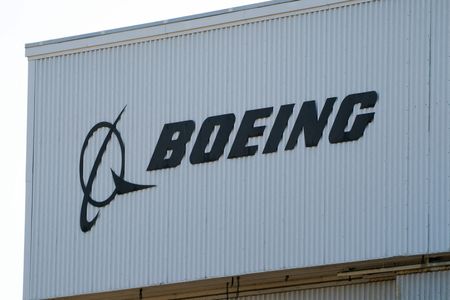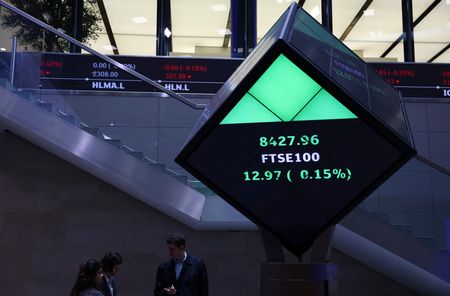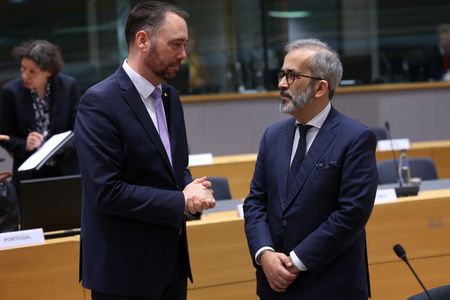By Philip Blenkinsop
BRUSSELS (Reuters) -The European Commission on Thursday proposed countermeasures on up to 95 billion euros ($107.2 billion) of U.S. imports if negotiations with Washington fail to remove the series of tariffs applied by U.S. President Donald Trump.
The new measures, representing the EU’s response to U.S. import taxes on cars and Trump’s broader “reciprocal” tariffs, would target U.S. wine, bourbon and other spirits, fish, aircraft, car and car parts, chemicals, electrical equipment, health products and machinery.
The European Commission, which coordinates trade policy for the 27-nation EU, said it was launching a public consultation to June 10 for EU members and businesses to react to the proposals. It will then take a final decision on its counter-tariffs, likely to hit a smaller volume of U.S. imports.
“The EU remains fully committed to finding negotiated outcomes with the U.S.,” Commission President Ursula von der Leyen said in a statement. “At the same time, we continue preparing for all possibilities.”
The announcement of a new list of products the EU might target came on the day Trump announced a trade deal between the United States and Britain, the first to soften the impact of Trump’s global tariff blitz on an important trade partner.
The EU faces 25% U.S. import tariffs on its steel, aluminium and cars and so-called “reciprocal” tariffs of 10% for almost all other goods, a levy that could rise to 20% after Trump’s 90-day pause expires on July 8.
The Commission has repeatedly said it would prefer a negotiated solution to tit-for-tat tariffs, but wants to have a retaliatory response ready for July in case no solution is found.
In April, the EU approved duties mostly of 25% on U.S. imports amounting to 21 billion euros, including maize, wheat, motorcycles and clothing. These, a response to U.S. metals tariffs, were suspended before entering into force, after Trump announced his 90-day pause.
The Commission has said that U.S. tariffs now cover 380 billion euros or 70% of EU goods trade to the U.S. and that could rise to 97% after further U.S. investigations into pharmaceuticals, semiconductors, critical minerals and trucks.
The EU has not included pharmaceutical products or semiconductors on its list.
The Commission has been encouraging affected businesses to submit their views. At a consultation in March into the EU’s countermeasures against U.S. metals tariffs, the Commission received 660 responses.
CARMAKERS
BMW, the biggest auto exporter in the United States by value, declined to comment on the EU proposals, saying these were the basis for discussion over the coming weeks and reiterating that both sides should seek common ground based on free trade.
German manufacturers, including Mercedes-Benz, produced more than 844,000 vehicles in the United States last year, around half of which were exported, according to lobby group VDA.
EU spirits association spiritsEUROPE said tariff-free transatlantic spirits trade dated back to 1997 and urged EU and U.S. negotiators to intensify their efforts to reach an agreement by no later than early July.
The potential EU countermeasures do not match the volume of products covered by U.S. tariffs because EU imports are far less than its goods exports to the United States – at 335 billion euros in 2024 versus 532 billion euros of exports.
EU officials said the bloc wanted to deliver a proportionate response that did not escalate the conflict.
The United States does have a trade surplus with the EU in services.
The Commission said it was also looking into placing export restrictions on 4.4 billion euros of steel scrap and chemical products to the United States. Scrap, a feedstock for the steel industry, is not covered by the U.S. metal tariffs and there are concerns it could be sold outside the bloc.
The Commission further said it would launch a complaint at the World Trade Organization over U.S. tariffs, a procedure that begins with consultations between the parties.
U.S. Vice President JD Vance said on Wednesday discussions between the United States and Europe were ongoing and that Washington was pressing the EU to lower its own tariffs and regulatory barriers to improve the trading relationship.
($1 = 0.8859 euros)
(Reporting by Philip Blenkinsop; Additional reporting by Christoph Steitz and Emma Rumney; Editing by Philippa Fletcher)










